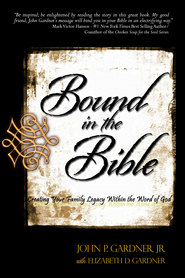I have yet to meet a godly grandparent who does not find enormous joy in seeing their grandchildren walking with Christ. It is also true that have yet to meet a Christian grandparent who does not feel extreme anguish and sadness over a grandchild that has strayed from God’s truth and been taken captive by the world.
While there is no guarantee that any child will choose the path of truth if we teach them well, I do believe that those who are intentional about building a legacy of truth are much more likely to experience the joy the Apostle John described than those who are not intentional. When parents and grandparents take the role of discipleship seriously, their children are nine times more likely to embrace the truth and walk in it as adults.
I had the privilege of meeting John Gardner in October during a Courageous Grandparenting speaking tour in South Carolina. John shared with me how he and his wife have intentionally employed a tool for building a well-versed legacy with their children. I was so impressed with what he is doing, that I just have to share it with you.
You can learn more in his book, Bound in the Bible.
“Legacies are created,” he writes, “when we take time to string moments in our lives together, like the small pieces of popcorn kids string together to create what seems like miles of garland on a Christmas tree. As we record our thoughts and experiences in just a few moments each week or each day, the paths for our lives will become more apparent to us and to our children.”
John’s concept is quite simple, actually. It starts with a personal Bible for each child. John uses each Bible on different days for his own reading and study. He writes notes and comments in the margins of the Bibles specifically for each child. He now has hundreds of such margin notes in each child’s Bible. When they graduate, Mom and Dad present those Bibles to them with all the notes and specific comments from other family members as well.
John wisely instructs us not to write merely warm and fuzzy comments, but comments that capture your “faith and beliefs, your joys and sorrows, and your children’s greatest triumphs, tragedies, innocent idioms and significant events…your own family legacy bound within the Word of God.”
While not the only tool they use for building a love for God’s Word in their family, it is a powerful addendum to intentional discipleship helping their children grow and begin their lives as adults. Oh…by the way, John says it’s never to late to start.
Click here to get a copy of John’s book and learn how to effectively build this well-versed legacy in your family. What a great written legacy to present to each grandchild when they graduate and launch out on their own. We all leave a legacy. What legacy will you leave? Will it be a well-versed legacy bound in the Word of God?







0 Comments